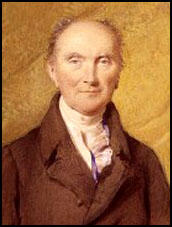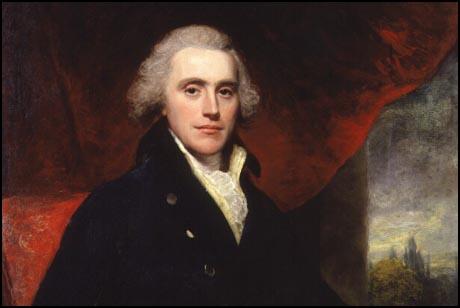Henry Addington, Lord Sidmouth

Henry Addington was born in 1759. Henry's father, Dr. Anthony Addington, had several important patients including the prime minister, Lord Chatham and his son, William Pitt. After being educated at Winchester School and Oxford University he became a lawyer.
Addington's friendship with the Pitt family helped him obtain the seat for Devizes in 1784. Later that year, William Pitt, like his father before him, became prime minister of Britain. Henry Addington was a loyal supporter of Pitt's Tory administration. Although Addington was only thirty, in 1789 Pitt suggested that he should become speaker of the House of Commons. Addington agreed with the proposal and with the help of Pitt was elected as speaker. The post received a salary of £6,000 a year and this enabled Addington to purchase a large estate in Reading.
William Pitt's policy of Catholic Emancipation so upset King George III that he asked Addington to help him remove his prime minister. After discussing the matter with William Pitt, Addington agreed, and in 1801 he became Britain's new prime minister. Several ministers such as George Canning and Lord Castlereagh who agreed with Pitt's policy on Catholics, refused to serve under Addington. Henry Addington was an unpopular prime minister and in 1804 large numbers of his own party turned against him and he decided to resign.

The following year Addington was granted the title of Lord Sidmouth and agreed to serve as a minister in Pitt's government. However, he only served under William Pitt for six months. When Pitt refused to promote Viscount Sidmouth's friends he resigned from the cabinet.
In 1812 Lord Liverpool became prime minister and he offered Sidmouth the post of Home Secretary in his new government. Viscount Sidmouth now had the responsibility of dealing with social unrest in Britain. This included making machine-breaking an offence punishable by death. On one day alone, fourteen Luddites were executed in York. Social unrest continued and in 1817, Sidmouth was responsible for the passing of what became known as the Gagging Acts. This resulted in the arrest and imprisonment of radical journalists such as Richard Carlile.
The unpopularity of Sidmouth increased in 1819 after he wrote a letter supporting the action of the magistrates and the Manchester & Salford Yeomanry at what opponents called the Peterloo Massacre. In November 1819, Sidmouth persuaded Parliament to pass a series of repressive measures that became known as the Six Acts. Sidmouth retired from office in 1821. He continued to support the Tories in parliament and voted against Catholic Emancipation in 1829 and the Reform Act of 1832.
Lord Sidmouth died on 15th February 1844.
Primary Sources
(1) Lord Sidmouth, wrote a letter to Mary Anne Addington about the Peterloo Massacre on 18th August, 1819.
The proceedings were not of an ordinary character, but they will I trust, prove a salutary lesson to modern reformers. Hunt and his associates are in custody, and their flags etc. have been seized and destroyed by the special constables and soldiery, all of whom have behaved with the greatest spirit and temper, but forbearance became impossible.
(2) Lord Sidmouth, letter to Lord Liverpool about the introduction of the proposed Six Acts (1st October, 1819).
It is with deep regret that the determination to assemble Parliament has been so long delayed. The existing means of stopping the progress, not merely insurrection but rebellion, have long since proved to be utterly insufficient, but hitherto my colleagues have remained unconvinced of the imperious and urgent necessity of advising the adoption of the only measure, which would of itself, animate the loyal and awe the disaffected, and by which alone effectual means can be provided to meet and overcome a danger greater, as I am firmly and deliberately convinced, than any to which the country has been exposed since the accession of the present Royal Family to the throne.
I feel, and I have felt for some time past, for whilst the country is suffering from the want, as I conceive, of those decisive and efficient measures, which the crisis calls for, my reputation is suffering also; though I trust there has been no want or vigour or promptitude in the employment of the inefficient and inadequate means, which the existing laws have placed in my hands.

